- Home
- Gayle Forman
Just One Day jod-1 Page 7
Just One Day jod-1 Read online
Page 7
I’ve hardly taken any pictures on this trip. Melanie teased me about it, to which I always said I preferred to experience something rather than obsessively record it. Though, really, the truth of it was, unlike Melanie (who wanted to remember the shoe salesman and the mime and the cute waiter and all the other people on the tour), none of that really mattered to me. At the start of the trip, I took shots of the sights. The Colosseum. Belvedere Palace. Mozart Square. But I stopped. They never came out very well, and you could get postcards of these things.
But there are no postcards of this. Of life.
I snap a picture of a bald man walking four bushy-haired dogs. Of a little girl in the most absurdly frilly skirt, plucking petals off a flower. Of a couple, unabashedly making out on the fake beach along the waterside. Of the Danes, ignoring all of this, but having the time of their lives playing cards.
“Oh, let me take one of the two of you,” Agnethe says, rising, a little wobbly, from the game. “Aren’t you golden?” She turns to the table. “Bert, was I ever that golden?”
“You still are, my love.”
“How long have you been married?” I ask.
“Thirteen years,” she says, and I’m wondering if they’re stained, but then she adds, “Of course, we’ve been divorced for ten.”
She sees the look of confusion on my face. “Our divorce is more successful than most marriages.”
I turn to Willem. “What kind of stain is that?” I whisper, and he laughs just as Agnethe takes the picture.
A church bell rings in the distance. Agnethe hands back the phone, and I take a picture of her and Bert. “You will send me that one? All of the ones?”
“Of course. As soon as I have reception.” I turn to Willem. “I’ll text them to you too, if you give me your number.”
“My phone is so old, it doesn’t work with pictures.”
“When I get home, then, I’ll put the pictures on my computer and email them to you,” I say, though I’ll have to figure out a place to hide the pictures from Mom; it wouldn’t be beyond her to look through my phone—or computer. Though, I realize now, only for another month. And then I’ll be free. Just like today I’m free.
He looks at one of the pictures for a long time. Then he looks at me. “I’ll keep you up here.” He taps his temple. “Where you can’t get lost.”
I bite my lip to hide my smile and pretend to put the phone away, but when Captain Jack calls to Willem to take the wheel while he visits the head, I pull it back out and scroll through the photos, stopping at the one of the two of us that Agnethe took. I’m in profile, my mouth open. He’s laughing. Always laughing. I run my thumb over his face, halfway expecting it to emanate some sort of heat.
I put the phone away and watch Paris drift by, feeling relaxed, almost drunk with a sleepy joy. After a while, Willem returns to me. We sit quietly, listening to the lapping of the water, the babble of the Danes. Willem pulls a coin out and does that thing, flipping it from knuckle to knuckle. I watch, hypnotized by his hand, by the gentle rocking of the water. It’s peaceful until the Danes start bickering, loudly. Willem translates: Apparently they’re hotly debating whether some famous French actress has ever made a pornographic film.
“You speak Danish too?” I ask.
“No, it’s just close to Dutch.”
“How many languages do you speak?”
“Fluently?”
“Oh, God. I’m sorry I asked.”
“Four fluently. I get by in German and Spanish too.”
I shake my head, amazed.
“Yes, but you said you speak Chinese.”
“I wouldn’t say I speak it so much as murder it. I’m kind of tone deaf, and Mandarin is all about tone.”
“Let me hear.”
I look at him. “Ni zhen shuai.”
“Say something else.”
“Wo xiang wen ni.”
“Now I hear it.” He covers his head. “Stop. I’m bleeding from my ears.”
“Shut up or you will be.” I pretend to shove him.
“What did you say?” he asks.
I give him a look. No way I’m telling.
“You just made it up.”
I shrug. “You’ll never know.”
“What does it mean?”
I grin. “You’ll have to look it up.”
“Can you write it too?” He pulls out his little black book and opens to a blank page near the back. He rifles back into his bag. “Do you have a pen?”
I have one of those fancy roller balls I swiped from my dad, this one emblazoned BREATHE EASY WITH PULMOCLEAR. I write the character for sun, moon, stars. Willem nods admiringly.
“And look, I love this one. It’s double happiness.”
“See how the characters are symmetrical?”
“Double happiness,” Willem repeats, tracing the lines with his index finger.
“It’s a popular phrase. You’ll see it on restaurants and things. I think it has to do with luck. In China, it’s apparently big at weddings. Probably because of the story of its origin.”
“Which is?”
“A young man was traveling to take a very important exam to become a minister. On the way, he gets sick in a mountain village. So this mountain doctor takes care of him, and while he’s recovering, he meets the doctor’s daughter, and they fall in love. Right before he leaves, the girl tells him a line of verse. The boy heads off to the capital to take his exam and does well, and the emperor’s all impressed. So, I guess to test him further, he says a line of verse. Of course, the boy immediately recognizes this mysterious line as the other half of the couplet the girl told him, so he repeats what the girl said. The emperor’s doubly impressed, and the boy gets the job. Then he goes back and marries the girl. So, double happiness, I guess. He gets the job and the girl. You know, the Chinese are very big on luck.”
Willem shakes his head. “I think the double happiness is the two halves finding each other. Like the couplet.”
I’d never thought of it, but of course that’s what it is.
“Do you remember how it goes?” Willem asks.
I nod. “Green trees against the sky in the spring rain while the sky set off the spring trees in the obscuration. Red flowers dot the land in the breeze’s chase while the land colored up in red after the kiss.”
_ _ _
The final section of the canal is underground. The walls are arched, and so low that I can reach up and touch the slick, wet bricks. It’s eerie, hushed but echoey down here. Even the boisterous Danes have shushed. Willem and I sit with our legs dangling over the edge of the boat, kicking the side of the tunnel wall when we can.
He nudges my ankle with his toe. “Thank you.”
“For what?”
“For arranging this.” He gestures to the boat.
“My pleasure. Thank you for arranging this.” I point above us, to where Paris is no doubt going about its business.
“Any time.” He looks around. “It’s nice, this. The canal.” He looks at me. “You.”
“I’ll bet you say that to all the canals.” But I flush in the musty, rich darkness.
We stay like that for the rest of the ride, swinging our legs against the side of the boat, listening as the odd bit of laughter or music from Paris seeps underground. It feels like the city is telling secrets down here, privy only to those who think to listen.
Eight
Arsenal Marina is like a parking lot for boats, tightly packed into cement piers on both sides of the water. Willem helps Captain Jack guide the barge into its narrow mooring, hopping out to tie the lines in complicated knots. We bid farewell to the Danes, who are now truly soused, and I take down Agnethe’s cell phone number, promising to text her the pictures as soon as I can.
As we get off, Captain Jack shakes our hands. “I feel a little bad to take your money,” he says.
“No. Don’t feel bad.” I think of the look on Willem’s face, of being in the tunnel. That alone was worth a hundred bucks.
> “And we’ll take it off you soon enough,” Gustav calls.
Jacques shrugs. He kisses my hand before he helps me off the boat, and he practically hugs Willem.
As we walk away, Willem taps my shoulder. “Did you see what the boat is named?”
I didn’t. It’s right on the back, etched in blue lettering, next to the vertical red, white, and blue stripes of the French flag. Viola. Deauville.
“Viola? After Shakespeare’s Viola?”
“No. Jacques meant for it be called Voilà, but his cousin painted it wrong, and he liked the name, so he registered her as Viola.”
“Okaaay—that’s still a little weird,” I say.
As always, Willem smiles.
“Accidents?” Immediately, a strange little tremor goes up my spine.
Willem nods, almost solemnly. “Accidents,” he confirms.
“But what does it mean? Does it mean we were meant to take that boat? Does it mean something better or worse would’ve happened to us if we hadn’t taken that boat? Did taking that boat alter the course of our lives? Is life really that random?”
Willem just shrugs.
“Or does it mean that Jacques’s cousin can’t spell?” I say.
Willem laughs again. The sound is clear and strong as a bell, and it fills me with joy, and it’s like, for the first time in my life, I understand that this is the point of laughter, to spread happiness.
“Sometimes you can’t know until you know,” he says.
“That’s very helpful.”
He laughs and looks at me for a long moment. “You know, I think you might be good at traveling after all.”
“Seriously? I’m not. Today is a total anomaly. I was miserable on the tour. Trust me, I didn’t flag down a single boat. Not even a taxi. Not even a bicycle.”
“What about before the tour?”
“I haven’t traveled much, and the kind I’ve done . . . not a lot of room for accidents.”
Willem raises a questioning eyebrow.
“I’ve been places. Florida. Skiing. And to Mexico, but even that sounds more exotic than it is. Every year, we go to this time-share resort south of Cancún. It’s meant to look like a giant Mayan temple, but I swear the only clue that you’re not in America is the piped-in mariachi Christmas carols along the fake river waterslide thing. We stay in the same unit. We go to the same beach. We eat at the same restaurants. We barely even leave the gates, and when we do, it’s to visit the ruins, but we go to the same ones every single year. It’s like the calendar flips but nothing else changes.”
“Same, same, but different,” Willem says.
“More like same, same, but same.”
“Next time when you go to Cancún, you can sneak out into the real Mexico,” he suggests. “Tempt fate. See what happens.”
“Maybe,” I allow, just imagining my mom’s response if I suggested a little freelance traveling.
“Maybe I’ll go to Mexico one day,” Willem says. “I’ll bump into you, and we’ll escape into the wilds.”
“You think that would happen? We’d just randomly bump into each other?”
Willem lifts his hands up in the air. “There would have to be another accident. A big one.”
“Oh, so you’re saying that I’m an accident?”
His smile stretches like caramel. “Absolutely.”
I rub my toe against the curb. I think of my Ziploc bags. I think of the color-coded schedule of all my activities that we’ve kept tacked to the fridge since I was, like, eight. I think of my neat files with all my college application materials. Everything ordered. Everything planned. I look at Willem, so the opposite of that, of me, today, also the opposite of that.
“I think that might possibly be one of the most flattering things anyone has ever said to me.” I pause. “I’m not sure what that says about me, though.”
“It says that you haven’t been flattered enough.”
I bow and give a sweeping be-my-guest gesture.
He stops and looks at me, and it’s like his eyes are scanners. I have that same sensation I did on the train earlier, that he’s appraising me, only this time not for looks and black-market value, but for something else.
“I won’t say that you’re pretty, because that dog already did. And I won’t say you’re funny, because you have had me laughing since I met you.”
Evan used to tell me that he and I were “so compatible,” as if being like him was the highest form of praise. Pretty and funny—Willem could stop right there, and it would be enough.
But he doesn’t stop there. “I think you’re the sort of person who finds money on the ground and waves it in the air and asks if anyone has lost it. I think you cry in movies that aren’t even sad because you have a soft heart, though you don’t let it show. I think you do things that scare you, and that makes you braver than those adrenaline junkies who bungee-jump off bridges.”
He stops then. I open my mouth to say something, but nothing comes out and there’s a lump in my throat and for one small second, I’m scared I’m going to cry.
Because I’d hoped for baubles, trinkets, fizzy things: You have a nice smile. You have pretty legs. You’re sexy.
But what he said . . . I did once turn in forty dollars I found at the food court to mall security. I have cried in every single Jason Bourne movie. As for the last thing he said, I don’t know if it’s true. But I hope more than anything that it is.
“We should get going,” I say, clearing my throat. “If we want to get to the Louvre. How far is it from here?”
“Maybe a few kilometers. But it’s fast by bike.”
“You want me to wave one down?” I joke.
“No, we’ll just get a Vélib’.” Willem looks around and walks toward a stand of gray bicycles. “Have you ever heard of the White Bicycle?” he asks.
I shake my head, and Willem starts explaining how for a brief time in Amsterdam in the 1960s, there used to be white bicycles, and they were free and everywhere. When you wanted a bike, you grabbed one, and when you were done, you left it. But it didn’t work because there weren’t enough bikes, and people stole them. “In Paris, you can borrow a bike for free for a half hour, but you have to lock it back up, or you get charged.”
“Oh, I think I just read they started something like this back home. So, it’s free?”
“All you need is a credit card for the deposit.”
I don’t have a credit card—well, not one that doesn’t link back to my parents’ account, but Willem has his bank card, though he says he isn’t sure if there’s enough. When he runs it through the little keypad, one of the bikes unlocks, but when he tries it again for a second bike, the card is declined. I’m not entirely disappointed. Cycling around Paris, sans helmet, seems vaguely suicidal.
But Willem’s not replacing the bike. He’s wheeling it over to where I’m standing and raising the seat. He looks at me. Then pats the saddle.
“Wait, you want me to ride the bike?”
He nods.
“And you’ll what? Run alongside me?”
“No. I’ll ride you.” His eyebrows shoot up, and I feel myself blush. “On the bike,” he clarifies.
I climb onto the wide seat. Willem steps in front of me. “Where exactly are you going to go?” I ask
“Don’t worry about that. You just get comfortable,” he says, as if it’s possible in the current situation, with his back inches from my face, so close I can feel the heat radiating off of him, so close I can smell the new-clothes aroma of his T-shirt mingling with the light musk of his sweat. He puts one foot on one of the pedals. Then he turns around, an impish grin on his face. “Warn me if you see police. This isn’t quite legal.”
“Wait, what’s not legal?”
But he’s already pushed off. I shut my eyes. This is insane. We’re going to die. And then my parents really will kill me.
A block later, we’re still alive. I squint an eye open. Willem is leaning all the way forward over handlebars, effortlessly s
tanding on the pedals, while I lean back, my legs dangling alongside the rear wheel. I open my other eye, release my clammy grip on the hem of his T-shirt. The marina is well behind us, and we are on a regular street, in a bike lane, cruising along with all the other gray bicycles.
We turn onto a choked street full of construction, half the avenue blocked by scaffolding and blockades, and I’m looking at all the graffiti; the SOS, just like on the T-shirt for that band Sous ou Sur is scrawled there. I’m about to point it out to Willem, but then I turn in the other direction and there’s the Seine. And there’s Paris. Postcard Paris! Paris from French Kiss and from Midnight in Paris and from Charade and every other Paris film I’ve ever seen. I gape at the Seine, which is rippling in the breeze and glimmering in the early-evening sun. Down the expanse of it, I can see a series of arched bridges, draped like expensive bracelets over an elegant wrist. Willem points out Notre Dame Cathedral, just towering there, in the middle of an island in the middle of a river, like it’s nothing. Like it’s any other day, and it’s not the freaking Notre Dame! We pass by another building, a wedding-cake confection that looks like it might house royalty. But, no, it’s just City Hall.
It’s funny how on the tour, we often saw sights like this as we whizzed by on a bus. Ms. Foley would stand at the front of the coach, microphone in hand, and tell us facts about this cathedral or that opera house. Sometimes, we’d stop and go in, but with one or two days per city, most of the time, we drove on by.
I’m driving by them now too. But somehow, it feels different. Like, being here, outside, on the back of this bike, with the wind in my hair and the sounds singing in my ears and the centuries-old cobblestones rattling beneath my butt, I’m not missing anything. On the contrary, I’m inhaling it, consuming it, becoming it.
I’m not sure how to account for the change, for all the changes today. Is it Paris? Is it Lulu? Or is it Willem? Is it his nearness that makes the city so intoxicating or the city that makes his nearness so irresistible?

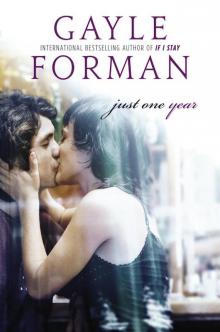 Just One Year
Just One Year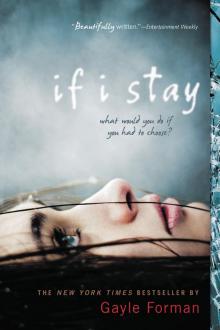 If I Stay
If I Stay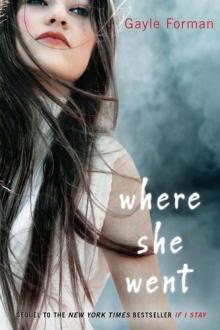 Where She Went
Where She Went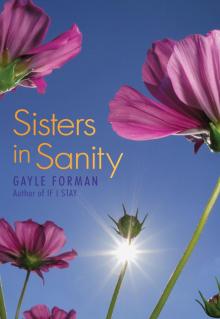 Sisters in Sanity
Sisters in Sanity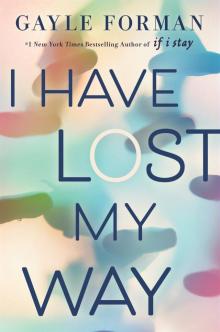 I Have Lost My Way
I Have Lost My Way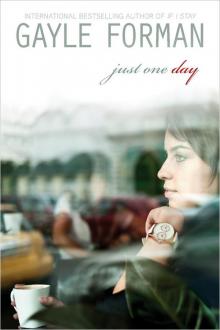 Just One Day
Just One Day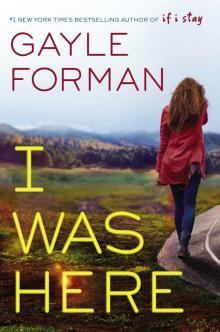 I Was Here
I Was Here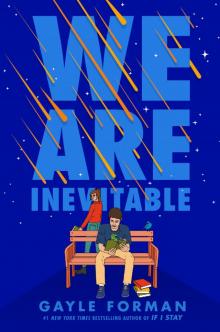 We Are Inevitable
We Are Inevitable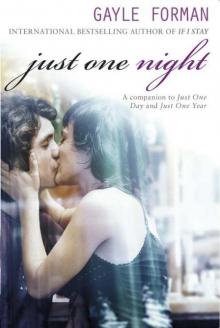 Just One Night
Just One Night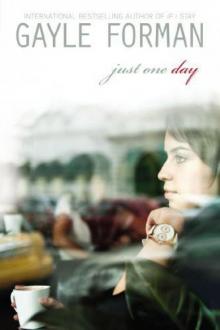 Just One Day jod-1
Just One Day jod-1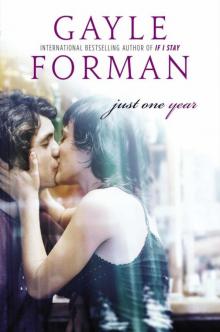 Just One Day 02: Just One Year
Just One Day 02: Just One Year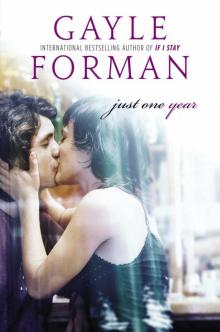 Just One Year jod-2
Just One Year jod-2